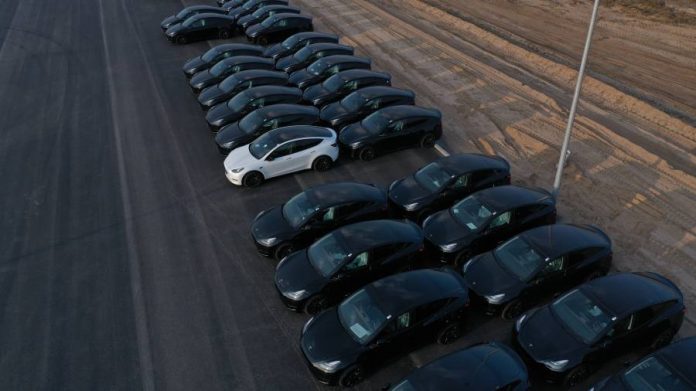More than 100,000 electric cars subsidised by the German taxpayer — including thousands of Teslas — have probably found their way abroad as buyers exploited a multibillion euro incentive scheme designed to make battery-powered cars more affordable for ordinary drivers.
Of the 890,000 electric cars registered in Germany over the past 10 years, the vast bulk of which were bought with grants, just 756,517 remain in the country, according to a study of official data.
While a small number of the missing cars will have been taken out of service, most of them have been sold to drivers in neighbouring countries at a profit, according to two leading industry figures.
“By the time the one millionth new battery electric passenger car is registered later this year, close to one-fifth of those cars would have left German roads during the last decade,” said Matthias Schmidt, a Berlin-based analyst who carried out the research.
“The loser is the German taxpayer, who is indirectly subsidising clean air in cities outside of Germany.”
Germany introduced the subsidy scheme in 2016 and has since spent at least €4.6bn on grants to electric vehicle buyers. Purchasers are entitled to a subsidy of up to €6,000 per car, depending on its size, initial cost and whether it was bought for a fleet.
But many subsidised vehicles may have ended up in Denmark, where duties on the purchase of new cars made electric vehicles more expensive than in neighbouring states for several years, Schmidt said.
Data from the Danish car importers association De Danske Bilimportører showed that the number of electric cars registered in the country was larger than the number bought in Denmark, suggesting many were imported.
Schmidt also found that of the 98,000 Teslas registered in Germany by July this year, only 76,690 remain on the country’s roads, meaning every fifth Tesla has left the German market. The US manufacturer started producing cars near Berlin this year.
“There is a pretty straightforward arbitrage going on,” a leading figure in the leasing industry said, adding that large corporate fleets in Germany were benefiting from the resale of subsidised electric models.
German opposition party Die Linke, long opposed to the subsidy scheme because they maintained it would benefit corporations, said it was always clear the incentives were “susceptible to fraud”.
“The fact that there was not even a one-year holding period [before a car could be sold on] is more than a technical error and opens the door to fraud,” said MP Bernd Riexinger.
The German coalition government plans to shrink the subsidy scheme from September 2023, scrapping incentives for fleet vehicles.
In response to a query about abuses of the scheme, the government said it would also double the amount of time cars have to be owned before they can be sold on, from six months, to a year.
“Anyone wanting to sell their subsidised electric car after less than a year would then have to pay back the subsidy,” the German economics ministry said in a statement.
“The loss in value of a used car is significantly higher after 12 months, so the business model of reselling to other European countries would become much less attractive,” it said, but emphasised that Germany needed a used market for electric cars and “especially for buyers with lower incomes”.

